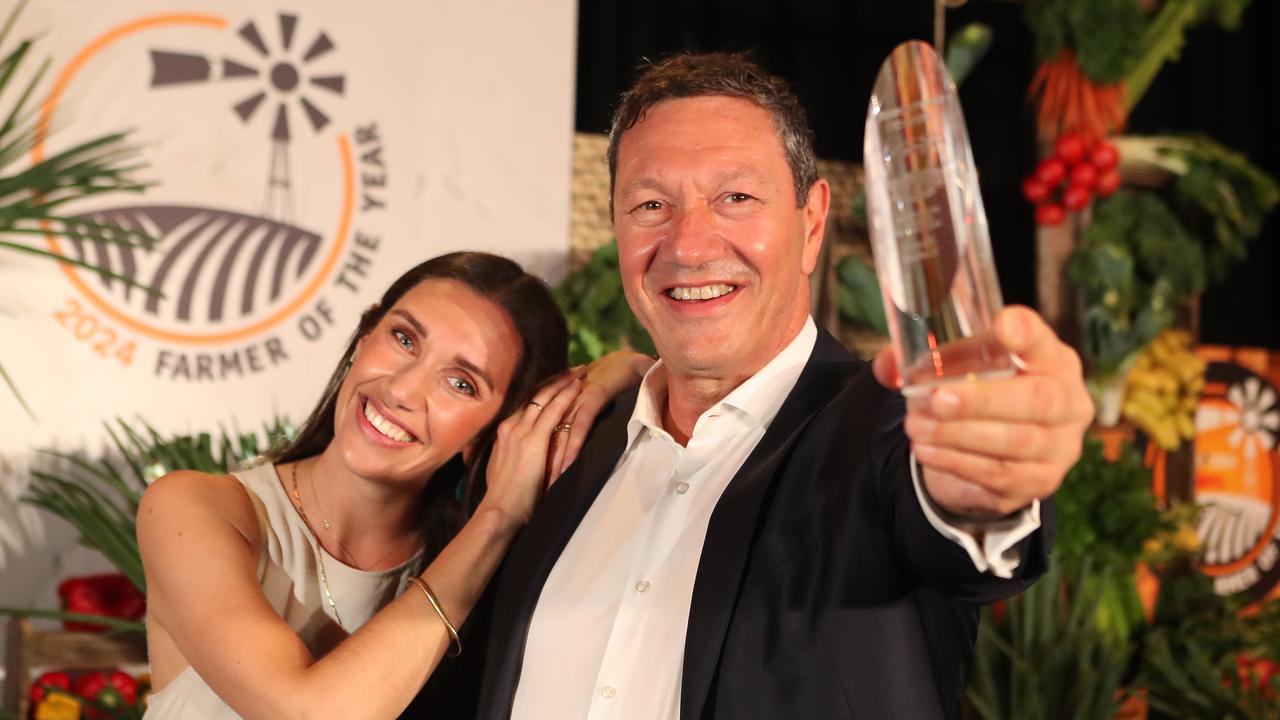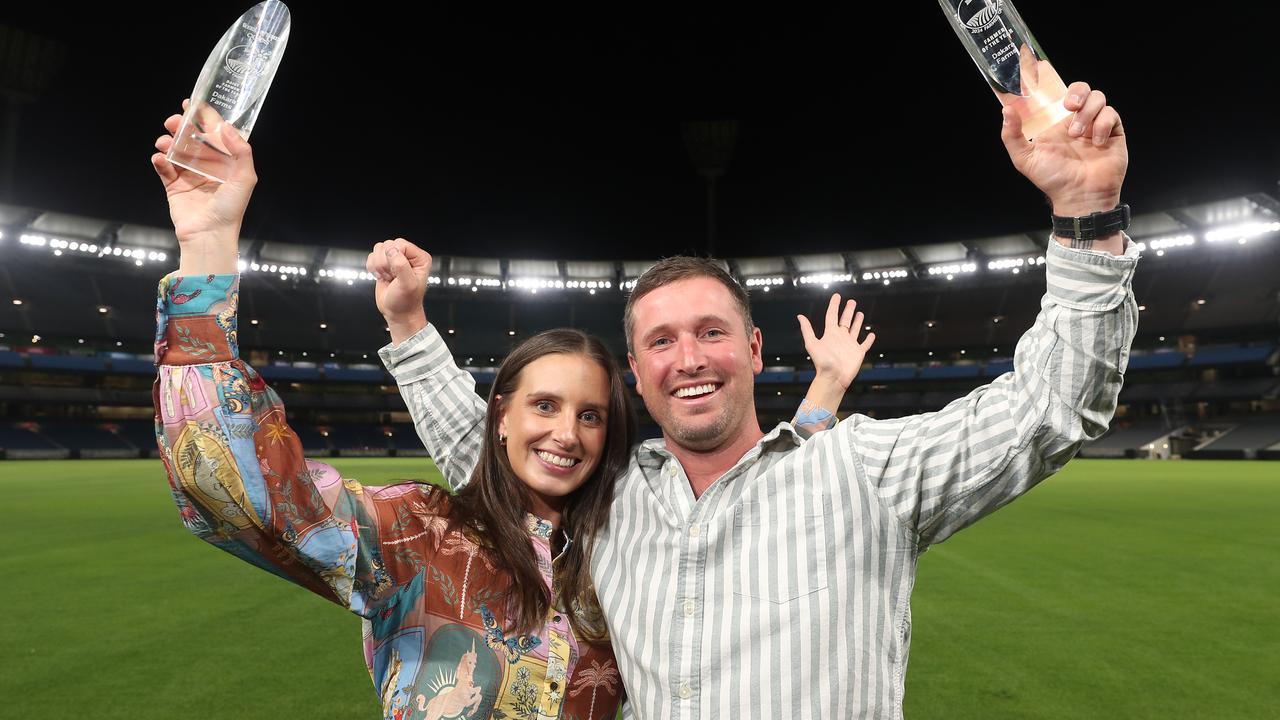Perry family from Trent Bridge Wagyu win 2019 The Weekly Times Coles Beef Farmer of the Year
The Perry Family from Trent Bridge Wagyu in Aberfoyle have been crowned the 2019 Beef Farmers of the Year. Read more about their business and see the finalists.
Australia’s top beef, cropping, dairy, horticulture, innovative and sheep farmers have been recognised at The Weekly Times Coles 2019 Farmer of the Year Awards. The following three growers vied for the title of Beef Farmer of the Year.
WINNERS: TRENT BRIDGE WAGYU
PERRY FAMILY, ABERFOYLE, NSW
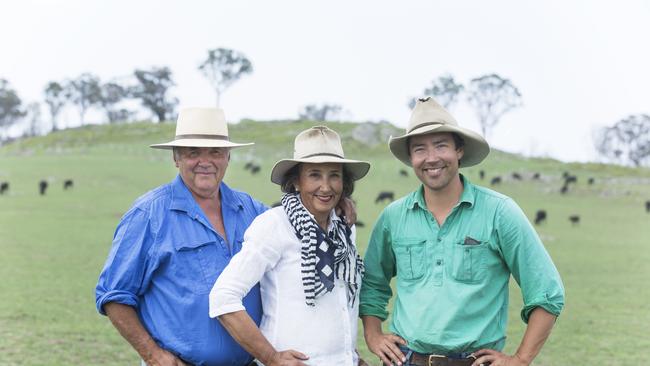
PERRYS HAVE EYES ON THE PRIZE
THEY’VE seen drought, a bushfire and a jaw-dropping $200,000 single-cow sale in the past year.
Impressively, Wal and Jen Perry, and their son Charlie, ride the highs and the lows with composure, never losing sight of their main game plan to produce high-marbling Wagyu cattle that tastes good on the consumer’s plate.
The Perrys have built their successful Trent Bridge Wagyu enterprise over 1214 hectares at Aberfoyle and Ebor on the NSW Northern Tablelands, and see a bright future for the breed.
One of their cows sold last year for the staggering six-figure sum – the largest amount any female cow in Australia has ever fetched.
“We thought she’d make $20,000, so to go $180,000 above that was a bit of a surprise,” Charlie says.
Despite the huge boost to their bottom line confirming they must be doing something right, the family is still modest about their success.
Charlie says the exceptional eating quality of Wagyu meat is what really drives them to build the business. “We just couldn’t believe the taste,” he says, remembering the first time they tried Wagyu more than 15 years ago.
It was this experience that put the former sheep farmers on the path to breeding the highly sought-after beef cattle, lauded by top-end restaurants worldwide.
Selling about 80 bulls a year, as well as embryos and semen, they use tried and tested methods to advance their herd, but are always first to jump on any validated advance in technology. Feed rations are carefully managed, and the family invested “early and hard” in Wagyu genetics.
“I watched the Angus breed change over 30 years with aggressive adoption of estimated breeding values. We embraced the science and have seen improvement every year,” Charlie says.
A positive attitude and adapting easily to change also sets the Perry family apart, with 2019 one of the most trying years for Trent Bridge.
They’ve battled drought, feeding out cattle for months on end, and lost 20 per cent of their property and kilometres of fencing to a fire at Ebor. Despite it all, the care they put into their herd shines through in the end product.
This quiet determination and commitment to excellence make Trent Bridge Wagyu worthy winners of The Weekly Times Coles 2019 Beef Farmer of the Year.
FINALIST: BARFOLD BEEF
SHEA FAMILY, BARFOLD, VIC
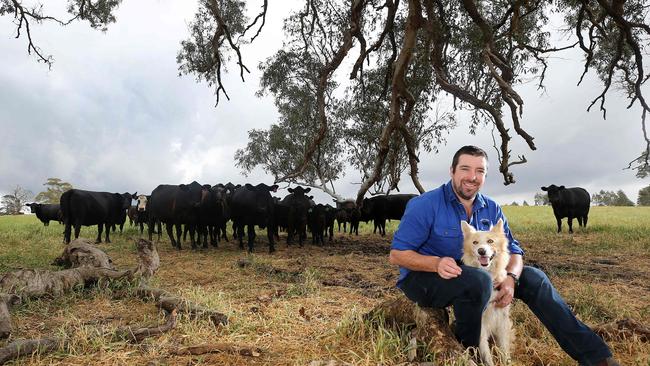
QUALITY WEANERS THE SHEA WAY
MATT Shea doesn’t have a beef with the high land prices around his central Victorian farm.
In fact, he’s employed a clever strategy to expand his family’s beef operation based on them.
Instead of buying extra country, he opts to lease land and agist cattle, allowing him to invest in what counts – improving the quality of the herd.
That doesn’t just mean buying better bulls. Matt uses an extensive artificial-insemination program, which gives him access to some of the best bloodlines in the industry without the large financial outlay to buy the physical animal.
Matt and his family run the finely tuned Barfold Beef business across 1420 hectares of owned and leased land at Barfold, near Kyneton. Over the past few years, they have artificially inseminated about 500 cows and heifers to rapidly add extra quality to the already strong reputation of their herd.
Matt continually pushes his cattle using the best genetics the business can afford, sourced from the renowned Te Mania stud at Mortlake with whom the Sheas have worked to design the herd’s breeding program.
“We want to continue to improve our herd and be ahead of the game,” Matt says. “You need to be able to be innovative.”
Always conscious of their bottom line, the Sheas believe marketing their cattle as weaners for other farmers to finish makes dollars and sense. The calves are sold to a mix of repeat and new buyers each year and Matt cites these networks as critical to the success of the business.
“Everything is about relationships and repeat buyers for your cattle are very important,” Matt says.
“Clearly it’s always good to get new buyers, but those repeat buyers tend to provide you with feedback about your cattle.”
In an effort to increase market opportunities, Matt says the business has dabbled in selling its own beef, though a hamburger shop in Bendigo and a butcher shop in Kyneton.
With sustainability front and centre, the business has also aligned itself with a number of industry-run programs including Greenham’s Never Ever, which markets high-quality, ethically produced meat.
By playing to their strengths and thinking outside the standard paddock, the Shea way is proving the right way.
FINALIST: KOOLOMURT PASTORAL
WYLD FAMILY, COLERAINE, VIC
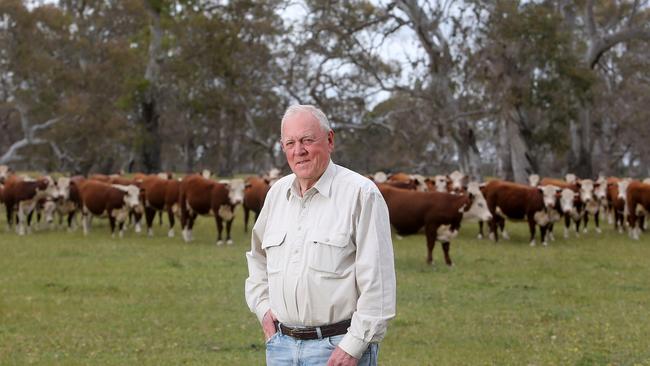
WYLD ONE AT THE FOREFRONT OF CHANGE
RIDING out the Wyld times of farming has come naturally for one of Victoria’s best-known beef producers.
John and Anne Wyld, who operate Koolomurt Pastoral from their home farm near Coleraine in the Western District, have made their mark in the beef industry in recent times by successfully adapting to changing market conditions.
Breeds, genetics and on-farm management plans are just a few elements the Wylds have overhauled to allow their business, which runs 1800 Hereford, Angus and black baldy cows, to not just survive, but thrive.
Perhaps the biggest change for the Wylds has been the move away from selling weaners at saleyards “on the one day … which can leave you exposed” to instead finishing the cattle themselves in a higher-rainfall area at the other end of the state.
Now, each November, all Hereford and black baldy steers born on the Wylds’ Coleraine property are transported to Tarwin Lower in South Gippsland, where they are fattened for the burgeoning grassfed market.
A keen observer of world beef trends who sat on the boards of Meat and Livestock Australia and Cattle Council of Australia, John says he wants to take advantage of the rapid increase in demand for this type of beef.
“Grassfed beef is certainly very fashionable at the moment,” John says.
“It is very popular in the US … and there is also a big trickle-down effect even in Australia, where people are wanting to know more about the provenance of their meat.
“But you always need to keep your eye on the future – grass feeding is a challenge because there is really only one window on a property each year to be able to finish steers on grass.”
The Wylds are one of the best-known Hereford producers in western Victoria, but now half their herd comprises black baldies.
“If you have the right quality animal, it does not matter what colour it is when it is hanging up,” he says.
It’s this no-nonsense approach that continues to serve their business well.
MORE WINNERS:

